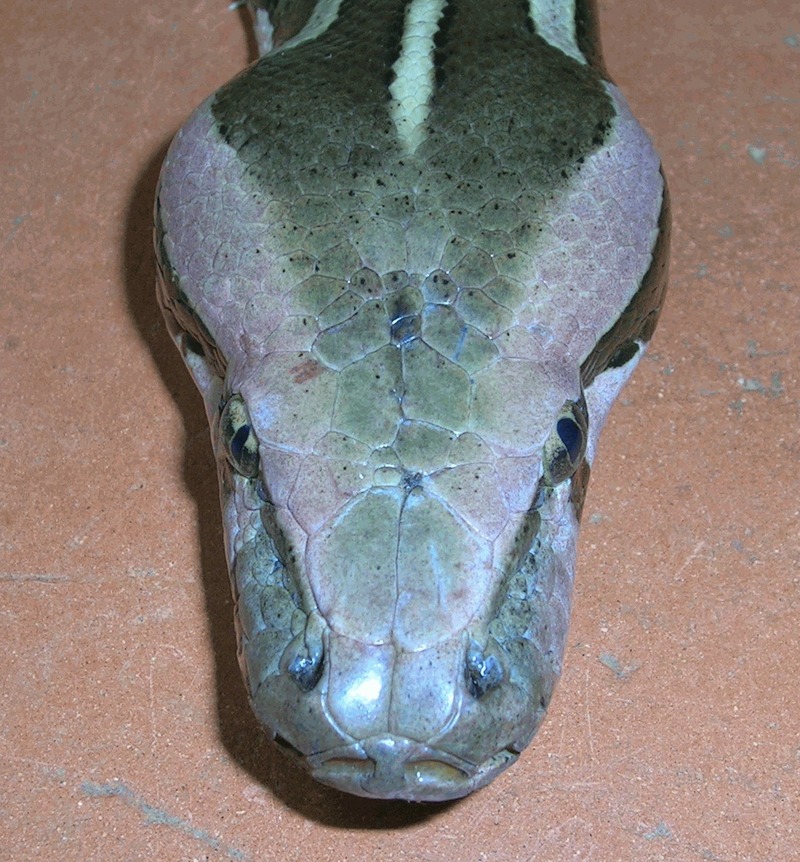|
| Query: Smooth snake | Result: 26th of 60 | |
Indian Rock Python (Python molurus molurus) - Wiki
| Subject: | Indian Rock Python (Python molurus molurus) - Wiki
| |

| Resolution: 1178x1270
File Size: 476496 Bytes
Upload Date: 2006:12:18 14:34:05
|
ERROR : Server Busy(-1105)
ERROR : Server Busy(-1105)
Indian Rock Python (Python molurus molurus) - Wiki
Indian Python
From Wikipedia, the free encyclopedia
[Photo] Head of Indian Rock Python (Python molurus) Photograph by L. Shyamal Wynaad, 2006
The Indian Python or Indian Rock Python (Python molurus molurus) is a python found in India in a variety of habitats including estuarine mangrove forest, arid scrub jungle and rain forest.
Identification
Pythons are very easy to identify. They are distinguished from all other Indian snakes by the presence of sensory pits on the rostral (snout shield) and first two labials. Pythons are the most massively built snakes found in the region. They grow to an average length of 4 m with the relative girth exceeding that of all other snakes, and weigh 70 to 129 pounds on an average. The longest recorded specimen measured 19 ft 2 in (5.85 m) (Cooch-Behar, West bengal). Their scales are smooth and generally glossy for a snake in good condition. They have a flattened head with large nostrils, directed upwards and situated high on the snout. Their eyes are small and the pupil vertical, with the iris apparently flecked with gold. Pythons have, what is commonly called, spurs, which are vestigial or rudimentary limbs situated on either side of the anal vent. Adult Pythons are whitish or yellowish in colour with the blotched patterns varying from shades of yellow to dark brown. The colouration also varies with terrain and habitat. The pythons of the hill forests of Western Ghats and Assam are darker, and those of the Deccan Plateau and East Coast are usually lighter.
Habitat and Status
Pythons usually dwell in the jungles, occurring in dense as well as open forests. They may also be found near rivers and lakes. They sometimes occupy abandoned mammal burrows, hollow trees, dense water reeds and mangrove thickets, normally near a permanent water source. These snakes have often been killed for their fine skin and are endangered. They are now partly protected by the Tamil Nadu Government. In Kerala and Tamil Nadu, python meat is eaten by locals as the fat has purported medicinal value. Like most snakes, they take one huge meal and can go for up to two years without eating. They depend on water.
Habits
Pythons are lethargic and slow moving snakes even in their native haunts, exhibiting little timidity and rarely rousing themselves to escape even when attacked. They have a peculiar method of movement, a rectilinear progression, the body moving in a straight line, which is absent in most snakes. They are very good swimmers and are quite home in water. They can be wholly submerged in water for many minutes if necessary, but usually prefer to remain near the bank.
They have been shown to be capable of raising their body temperature above the ambient level through muscular contractions.
Food
Pythons feed on mammals, birds and reptiles indiscriminately, but seem to prefer mammals. Roused to activity on sighting prey, the snake will advance with quivering tail and lunge with open mouth. Live prey are constricted and killed. One or two coils are thrown around the prey, holding it in a tight grip. The prey, unable to breathe, succumbs and is swallowed head first. Prior to swallowing, the snake smells the prey with the tongue. The snake is normally disinclined to move after a heavy meal, and if forced to move, hard parts may tear through the body, hence prompting some specimens to disgorge their prey if disturbed so they can escape from potential predators. After a heavy meal, a python may fast for several days or weeks, the longest recorded duration being 2 years. A lot has been said in movies and books about the danger that this snake poses to man but till date there has been no authentic case of a human being eaten by a python.
http://en.wikipedia.org/wiki/Indian_Python
| The text in this page is based on the copyrighted Wikipedia article shown in above URL. It is used under the GNU Free Documentation License. You may redistribute it, verbatim or modified, providing that you comply with the terms of the GFDL. |
|
Comments |
|---|
| | Rakesh |
|
Hi sir,
i am snake handler in india. Now i will migrate to uk and i want gain knowledge about uk rockpython in uk. Could u give knowledge about these snakes. Reply me please...... |
| | mbbs_muthu |
|
| zzzzzzzzzzzzzzzz |
| | Guest |
|
Python molurus (Linnaeus, 1758)
Common Names: Indian python, black-tailed python, Indian rock python, Asian rock python
Synonyms: Python molurus molurus (Linnaeus, 1758) |
^o^
Animal Pictures Archive for smart phones
^o^
|
|
|